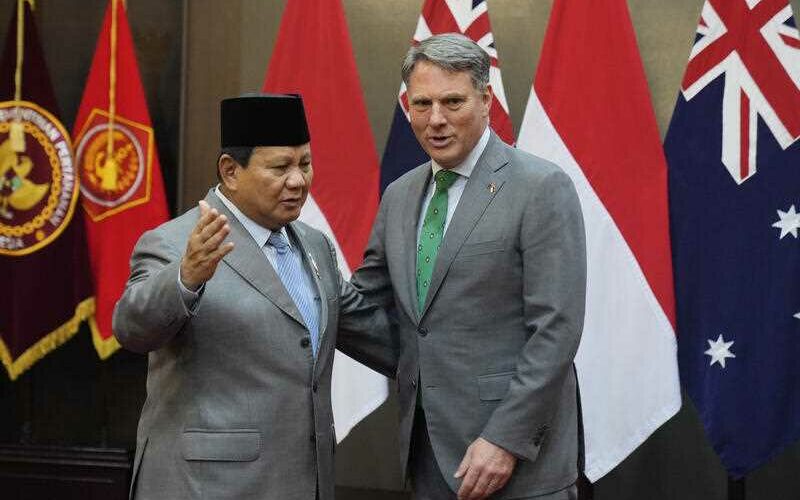Defence Minister Richard Marles’ has “high ambitions” for defence cooperation with Indonesia to reinforce a regional bulwark against China, but that’s led him to cuddle up to a notorious abuser of human rights. Rex Patrick and Philip Dorling unpack developments in Australia’s relations with Indonesia.
On 5 June 2023, Deputy Prime Minister and Minister for Defence Richard Marles held a media conference in Jakarta, telling journalists he’d “really enjoyed” meetings with his Indonesian counterpart, Defence Minister Prabowo Subianto. The Australian-Indonesian relationship “has never been in a better place than it is today,” Marles declared, adding that upgraded defence cooperation was vital given “the strategic significance of Indonesia, being one of our closest neighbours and obviously our largest neighbour.”
Marles considers his friendship with Prabowo to be vital in driving closer defence ties forward and has been investing heavily into it: turning a blind eye to the 71-year-old’s track record of human rights abuse and killings in East Timor and West Papua.
In the early 1990s, as the commander of Indonesian Army’s Kopassus Special Forces Group 3, then Major General Prabowo commanded special forces and militias that were responsible for murder, torture and other human rights abuses in East Timor. In 1996, he led Indonesian forces in bloody reprisal actions against West Papua separatists. In 1998, troops under Prabowo’s command kidnapped and tortured democracy activists and the General was implicated orchestrating mob violence in Jakarta against Indonesians of Chinese descent.
History of a failed relationship
Marles isn’t the first Labor Government Minister to cuddle up to an Indonesian General with a grisly human rights record. In the 1980s, Defence Minister Kim Beazley formed a close friendship with Indonesian military chief and Defence Minister L.B. “Benny” Moerdani, who was deeply implicated in Indonesia’s invasion of East Timor and subsequent human rights abuses.
Neither Beazley’s interaction, nor Paul Keating’s attempts to build a special relationship with President Suharto to foster political ties, worked to deliver a lasting security partnership. A quarter of a century later, however, Marles is pressing ahead with their failed endeavours, hoping that his personal relationship with Prabowo will deliver agreement on a new defence pact.
The key agenda item in Jakarta in June was negotiation of the new Defence Cooperation Agreement, which Marles declared would be “comprehensive” and “a big advancement in our security relationship.”
Four months earlier, on 9 February, Marles and Foreign Minister Penny Wong had hosted Prabowo and Foreign Minister Retno Marsudi at a combined defence and foreign ministers’ meeting in Canberra. The next day, the two Defence Ministers held further discussions and issued a statement of their intent to upgrade bilateral defence cooperation with a formal agreement that would be binding under international law.
Conclusion of a such an agreement is indeed the “centrepiece” of Australia’s current diplomatic and strategic engagement with Indonesia. Yet, secrecy is surrounding all of these politically sensitive discussions.
Security concerns revealed
Recent Freedom of Information applications to the Department of Defence and the Department of Foreign Affairs and Trade have yielded documents which, although heavily redacted, provide some insight into where Defence Minister Marles is taking Australia’s military ties with Indonesia.
A DFAT brief for Wong and Marles for the February meeting confirms regional security concerns to be at the front and centre of bilateral talks. The top agenda items were “Major Power Competition in Our Region” and “Maritime Security”. Other topics on the agenda included “Defence Policy Settings” and “Economic Resilience, Disinformation and Cyber”.
Although the word “China” does not appear in the unredacted text, there’s no doubt that the Beijing’s rising military power and diplomatic influence feature across much of the security agenda. Here Canberra’s wide-ranging concerns about China’s assertiveness dovetail with Jakarta’s insecurities about China’s “nine-dash line” encroachment on Indonesia’s Exclusive Economic Zone in the South China Sea north of the Natuna Islands.
One key Australian objective disclosed by DFAT is to “to build greater alignment with Indonesia on maritime cooperation and the promotion of UNCLOS [United Nations Convention on the Law of the Sea]. Australian talking points include a commitment to Indonesia to help advance “clear shared interests in maritime security”, including “supporting your efforts to protect your Exclusive Economic Zone across the
archipelago.”
High ambitions
Defence briefing for Marles encouraged the Deputy Prime Minister to underline “our high ambitions”, both in substance and timeframes. A draft agreement had already been provided to Marles’ office in late January. Defence’s briefing highlights the need for much broader defence cooperation, including “looking at ways to streamline access for each other’s personnel, ships and aircraft.” Marles wholeheartedly agreed, similarly emphasising the “high ambition” of the project in a letter seeking Wong’s concurrence.
Speaking in Jakarta in June, Marles declared himself well satisfied with the rapid progress of negotiations. “Our officials have met to start working through drafts of the agreement. What was clear in the direction that was given to our officials from both Minister Prabowo and myself was that we wanted this to be an ambitious agreement, which saw a high level of cooperation … And we’re very hopeful that we will see progress on that and ultimately an agreement that we can sign in the not-too-distant future.”
Given Indonesia goes to the polls on 14 February 2024 with Prabowo a declared presidential candidate, it appears likely Marles is hoping to seal the deal sometime in the next few months, that is before Christmas.
The race is on – the line-up to replace Joko Widodo as Indonesia’s next president is revealed
Defence Cooperation Agreement
But just what might the new Defence Cooperation Agreement lead to?
The April 2023 Defence Strategic Review identified China’s military rise as the dominant strategic fact: “Intense China-United States competition is the defining feature of our region and our time. …. China’s assertion of sovereignty over the South China Sea threatens the global rules-based order in the Indo-Pacific in a way that adversely impacts Australia’s national interests.” Curiously, Indonesia wasn’t mentioned once in the unclassified version of the Strategic Review. However, it emphasises “Investing in partnerships in [the Southeast Asia] region will be critical to maintaining the regional strategic balance.”
A new defence alliance with Australia’s northern neighbour is what Marles and Defence are working towards.
A new Defence Cooperation Agreement will sit alongside and reinforce the existing security cooperation framework between Australia and Indonesia, the 2006 Lombok Treaty. That treaty, the culmination of efforts to rebuild bilateral ties after the rupture caused by East Timor’s 1999 independence vote, provides for regular consultation on defence and security issues, development of military exchanges, education and joint exercises, as well as collaboration in defence technology.
There’s already a considerable amount of defence cooperation, including bilateral and multinational exercises. Last month, the Australian Defence Force deployed five M1A1 Abrams battle tanks in combat exercises in East Java. It was the first time Australia deployed battle tanks outside its territory since the Vietnam war.
A new legally binding agreement will provide the framework needed for Indonesian forces to join in large-scale exercises at Australian training areas such as Shoalwater Bay. It may also provide the basis for closer cooperation on maritime surveillance in the South China Sea. It wouldn’t be surprising to see Australian defence personnel in the future turning up on Natuna Island to assist Indonesian efforts to maintain surveillance over their EEZ. Safeguarding the waters around Natuna is important for Prabowo, who early in his time as Defence Minister was criticised for failing to do enough to stop Chinese fishing and other encroachments.
What about China?
Australian officials will also likely be looking for private assurances from Indonesia that in the event of a conflict with China over Taiwan or islands in the South China Sea, Jakarta won’t obstruct the free movement of Australian and allied warships through its archipelagic waters and won’t complain about interdiction of Chinese shipping in the Indian Ocean, a measure to block Chinese access to Middle East oil.
Much will depend, however, on the outcome of the Indonesian presidential election next February. Marles appears to have placed a large bet on Prabowo whose record of human rights abuse and right-wing nationalist and authoritarian tendencies is clear.
So far the only questioning of Marles’ plans has come from Australian Greens Senator David Shoebridge who in a Senate Estimates hearting in June left DFAT officials distinctly uncomfortable with questions about Prabowo’s human rights record. Shoebridge observed that Prabowo had “an appalling record of human rights abuses, but no one wanted to discuss that: “As I understand your evidence, that wasn’t even on the radar. It wasn’t raised.”
It’s an old saying that one should be careful about what one wishes for.
Next February Prabowo may achieve his long-held ambition to become Indonesia’s President. His authoritarianism and penchant for ruthless realpolitik has long been apparent. Marles may well fulfil his “high ambition”, but Labor’s desire for an Indonesian bulwark against China may well tie Australia to political developments in our neighbour we would rather keep our distance from.
AUKUS and B-52’s stand in the way of a treaty with Indonesia


